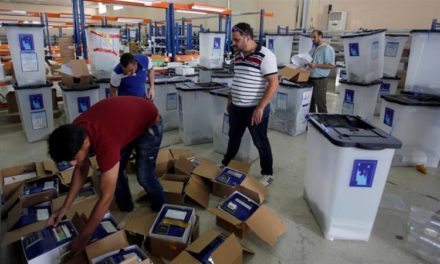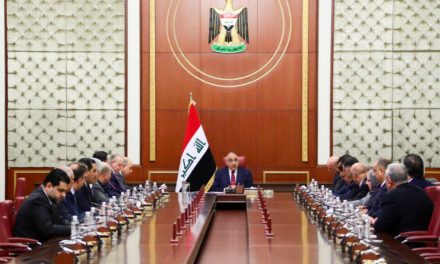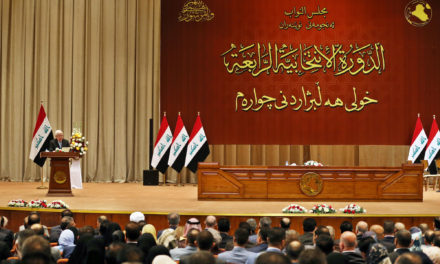The 2018 general election in Iraq was held on May 12 and has resulted in several negative headlines from allegations of fraud due to tampering with the new electronic ballot counting system adopted by the Independent High Electoral Commission (IHEC) to the Council of Representatives’ (parliament) mandate ending before the finalization of the election results, which is now being titled as a “constitutional crisis“. While the actions of IHEC members deserve their criticism at mishandling the election, the current process to finalize the results and form the next government is not a constitutional crisis, despite it being a lengthy one.
Calling what is currently happening in Iraq a constitutional crisis is either due to misunderstanding or a desire to constantly portray the political and legal scene in Iraq as a crisis. While Iraq is a democratizing state, it has experience with elections, and each one has been dealt with accordingly with the institutions in place meant to serve as checks and balances of power. One only has to look back at the 2010 election and understand what was perceived as a constitutional crisis back then, was handled legally by the Federal Supreme Court when there was a divided interpretation on Article 76 of the Iraqi Constitution on what is considered the largest bloc in parliament.
The process in 2010 took nine months before the Federal Supreme Court cleared up all the legal confusion and a new government was formed. At that time, the country was left with an operating executive branch, a prime minister and his ministers. The Council of Ministers maintained their responsibility to administer the government while unable to draft new laws until a legislative branch was mandated to operate. This will be the situation Prime Minister Haider Al-Abadi faces on July 1, 2018 the day after the mandate of this current parliament expires but the Council of Ministers remains in place until a new parliament convenes and the government formation process begins. With the 2018 federal budget passed earlier this year, this should allow the current Abadi administration to govern and spend until the end of the year.
To understand what is currently happening, the parliament’s term will come to an end on June 30, 2018, as it first convened on July 1, 2014. After four years, it has no legal basis to convene and therefore members of parliament return to being private citizens. The newly elected members of parliament are only able to convene once the Federal Supreme Court finalizes the election result, which has yet to happen, as all formal complaints regarding the election must be dealt with first. This is why we continue to see Speaker Saleem Al-Jabouri head parliamentary sessions after the election was held but will not do so after July 1, 2018. Since the election, parliament has made four amendments to the election law. The Federal Supreme Court has reviewed appeals to these amendments and so two of the four amendments were considered legal, one was not, and the fourth and final amendment has yet to be reviewed by the Court.
It is also necessary to note that the Council of Ministers set up an independent committee to review the election process. The committee released a list of recommendations such as annulling out of country voting due to the massive amount of fraud allegations. These recommendations were interpreted as the executive branch of government overstepping its legal authority by some, however, they were only recommendations for the Federal Supreme Court to take into consideration and not legally binding as the Council of Ministers does not have that authority to implement such recommendations. It is also important to note that despite the mishandling of the elections by IHEC, the prime minister did not intervene at any point in the lead up May 12 despite the warning signs that IHEC was ill-prepared as it is meant to be an independent commission.
As in 2010, there are lessons learned in Iraq’s 2018 election, such as the importance of having a genuinely independent commission running the election. The replacement of IHEC commissioners with judges is a welcome step that should be used in future Iraqi elections. Speaker Jabouri attempted to extend the mandate of the current parliament past June 30, 2018 until the election results are ratified. This was a failed attempt as Iraqi legal expert Tariq Harb states, given that the constitution is well-defined regarding the mandate of parliament and that it would require a constitutional amendment in order to actually be able to extend it. An amendment would require a nationwide referendum and Iraq has yet to see any made to its constitution since it was adopted in 2005.
The legal process may be long, but it is neither new to Iraq nor is it right to name it a constitutional crisis, as there is no confusion or misunderstanding amongst the electoral participants in the process to handle complaints and finalizing the results. This is a nascent democracy going through the democratic process necessary to ensure the correct and legal procedures of transitions of power takes place. While it is problematic that the country will have no functioning parliament for a short period of time, it does not warrant the doomsday headlines that have been produced.

Hamzeh Hadad
Hamzeh Hadad is an Iraqi writer and commentator. He is currently a Master of Arts candidate at the Norman Paterson School of International Affairs.










